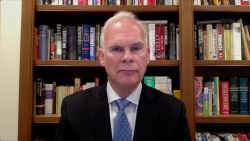India hit out at Pakistan and demanded it take “credible and viable action” over last week’s deadly bomb attack on a convoy of soldiers in Indian-administered Kashmir, after Pakistan’s Prime Minister offered to assist with investigations.
The Indian government has blamed a Pakistan-based terrorist organization for the attack, which killed at least 40 Indian paramilitary personnel.
“We demand Pakistan to stop misleading the international community and take credible and visible action against the perpetrators of Pulwama terrorist attack and other terrorists and terror groups operating from areas under their control,” India’s Foreign Ministry said in a statement Tuesday.
“It is a well-known fact that Jaish-e-Mohammad and its leader Masood Azhar are based in Pakistan. These should be sufficient proof for Pakistan to take action,” it added.
This was in response to Pakistani Prime Minister Imran Khan who denied his country’s involvement in the attack and offered to help with investigations into the incident.
“I want to offer the Indian government, whatever investigations you want done, we are ready. If you have any actionable intelligence, we will take action,” Khan said earlier Tuesday, in what was his first statement on the attacks.
“We are ready to talk about terrorism as well. Do you think we can solve the issue with war? This issue will be solved with dialogue like in Afghanistan.”
India blamed the bomb attack on Pakistan-based terrorist group Jaish-e-Mohammed and said there was “incontrovertible evidence” that Pakistan had a “direct hand” in the attack.
The attack in the Pulwama district of Kashmir was the deadliest on security forces in Indian-administered Kashmir since the beginning of the insurgency in the late 1980s.
Khan, who was elected prime minister in July 2018, hit back at India’s claims of Pakistani involvement.
“Firstly, you blamed us, without thinking, without any proof,” he said. “Why would we do such an act that would hurt us? We have fought a war, lost 70,000 people in a war on terror, now we are moving towards peace, why would we do this?”
Khan warned that the Indian government should not “remain stuck in the past,” and “blame any incident on Pakistan without moving to any positive steps.”
“I am telling you clearly, this is a new Pakistan, we are moving to stability. It is in our interest that no one uses our soil and we don’t allow anyone else to attack,” he said.
Retired Pakistani army officer, Lt. General Talat Masood told CNN that Khan was “playing it cool and statesman-like” and demonstrating that “Pakistan is very keen and willing to open up.”
“He’s also trying to say that Pakistan is interested in having good relations (with India)” said Masood, who is also a defense and security analyst. “I think the path that Pakistan is pursuing is in conflict with the kind of accusations coming from India.”
A post on Khan’s official Instagram account Tuesday featured an image of the prime minister against the backdrop of the national Pakistan flag and the words, “Don’t mess with my country.”
India promises retaliation
In response to the Kashmir attack, India promised retaliation, including commercial and diplomatic steps to “isolate” Pakistan internationally. Delhi has also left the door open for possible military action.
“At this time, the hopes the country has to respond are natural. Our security forces have been given full freedom. We have complete confidence in the courage and bravery of our soldiers,” Indian Prime Minister Narendra Modi said Friday.
Amid escalating tensions between the two nuclear armed countries, Mohammad Faisal, spokesperson for Pakistan’s Ministry of Foreign Affairs, announced Monday that the country had recalled Sohail Mahmood its high commissioner for India.
Pakistan has vehemently denied having a role in the attacks. “We have always condemned acts of violence anywhere in the world,” a Pakistan Ministry of Foreign Affairs statement said. “We strongly reject any insinuation by elements in the Indian media and government that seek to link the attack to Pakistan without investigations.”
Khan said on Tuesday that he had not made a statement before now because of the visit of Saudi Arabia Crown Prince Mohammed bin Salman, who made a two-day trip to Pakistan this week.

Tumultuous history
Kashmir, a largely mountainous region located between India and Pakistan, has had a tumultuous history.
The region has been bitterly contested by both India and Pakistan following the partition of the two countries in 1947, leading to three wars and numerous other skirmishes.
The attack last week comes more than two years after armed militants entered an army base in the garrison town of Uri, about 63 miles (102 kilometers) from Srinagar – killing 18.
Days after Thursday’s attack four Indian army personnel were killed Monday in a gunfight with militants in the Pulwama district of Indian-administered Kashmir.
Separatist violence in the region has killed more than 47,000 people since 1989, although this toll doesn’t include people who have disappeared due to the conflict. Some human rights groups and nongovernmental organizations put the death toll at twice that amount.
CNN’s Sophia Saifi in Islamabad, Sugam Pokharel and Nikhil Kumar in Delhi, and Mukhtar Ahmed in Srinagar contributed to this report.





















